AI Contract Review Tools Guide for Developers: Market, Players and More
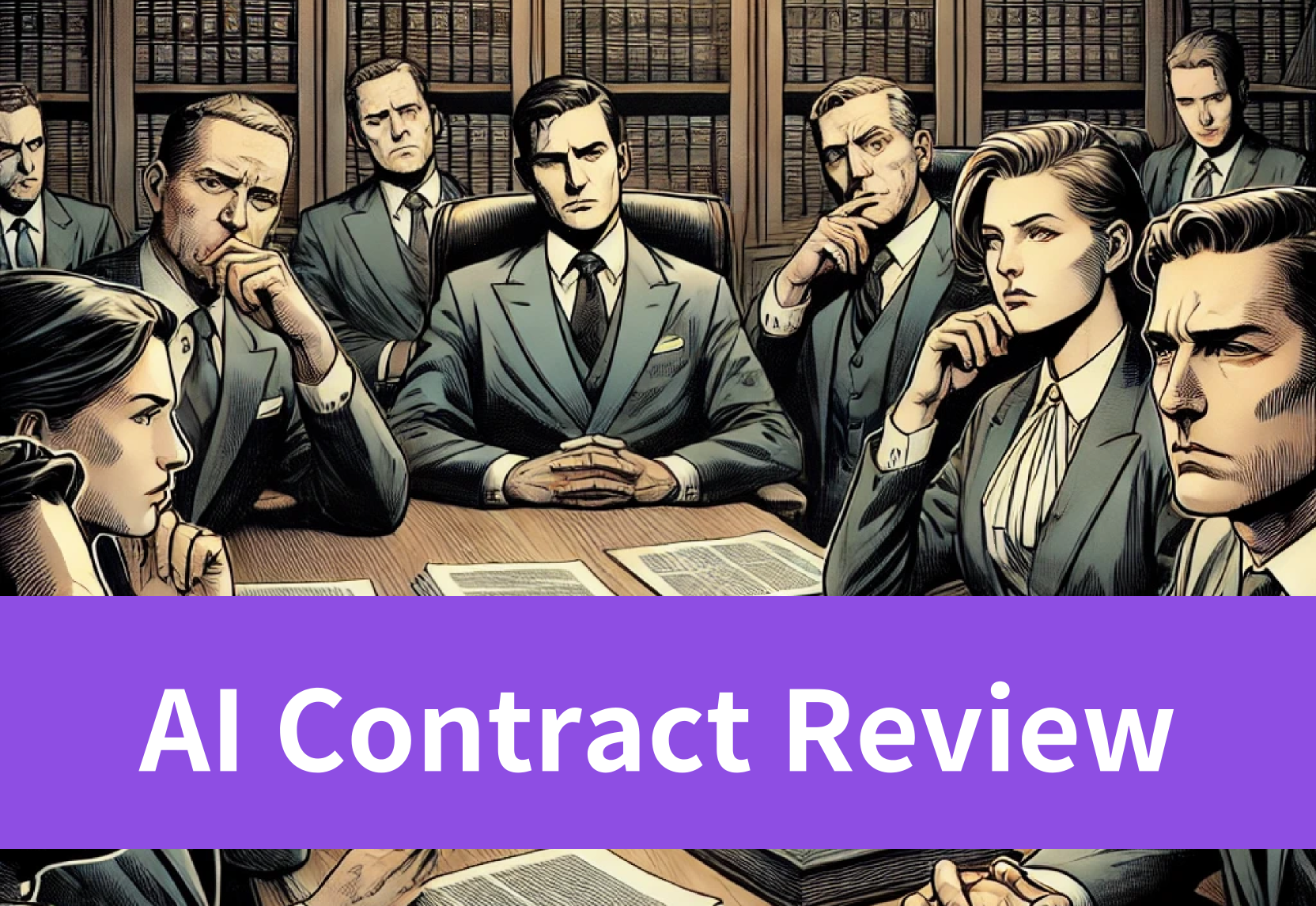
Key Highlights
- AI Contract Review Tools: These tools use AI to analyze legal documents, speeding up the review process by identifying key clauses and issues.
- Market Overview: The AI contract review market is growing rapidly, with a projected size of USD 17.8 billion by 2032. Cloud-based deployment and large enterprises dominate the market.
- Opportunities: Expansion of cloud solutions, integration with emerging technologies, enhanced data security, and regional growth opportunities, especially in Asia Pacific.
- Advantages Over ChatGPT: Legal-specific accuracy, customization, and advanced data handling.
- User Profiles: Legal professionals, HR, procurement, real estate, financial services, and more use these tools for efficiency and risk management.
- Benefits: Reduced review time, improved accuracy, cost savings, and better risk management.
- Top Tools: Examples include goHeather, Juro, ContractSafe, and Ironclad.
- Development Considerations: Focus on target audience, compliance, competition, technical integration (e.g. LLM API), and continuous improvement.
Introduction
As AI continues to revolutionize various industries, developers have a unique opportunity to create tools that significantly enhance legal workflows. AI contract review tools, in particular, are gaining traction for their ability to automate and streamline the traditionally labor-intensive process of contract analysis. This guide is designed for developers who are interested in building AI-driven contract review solutions, offering insights into the market landscape, key players, user profile, benefits and considerations for developing competitive and effective tools in this rapidly growing field.
What Are AI Contract Review Tools?
AI contract review utilizes artificial intelligence to analyze legal documents, making the contract review process faster and more efficient. These tools can identify key clauses and potential issues, helping users save time and money.
How Big Is the Market of AI Contract Review Tools?
The market of AI contract review tools belongs to the bigger market of intelligent document processing (IDP). According to Yahoo Finance, here is an overview of the IDP market and the opportunities it presents.
Market Overview
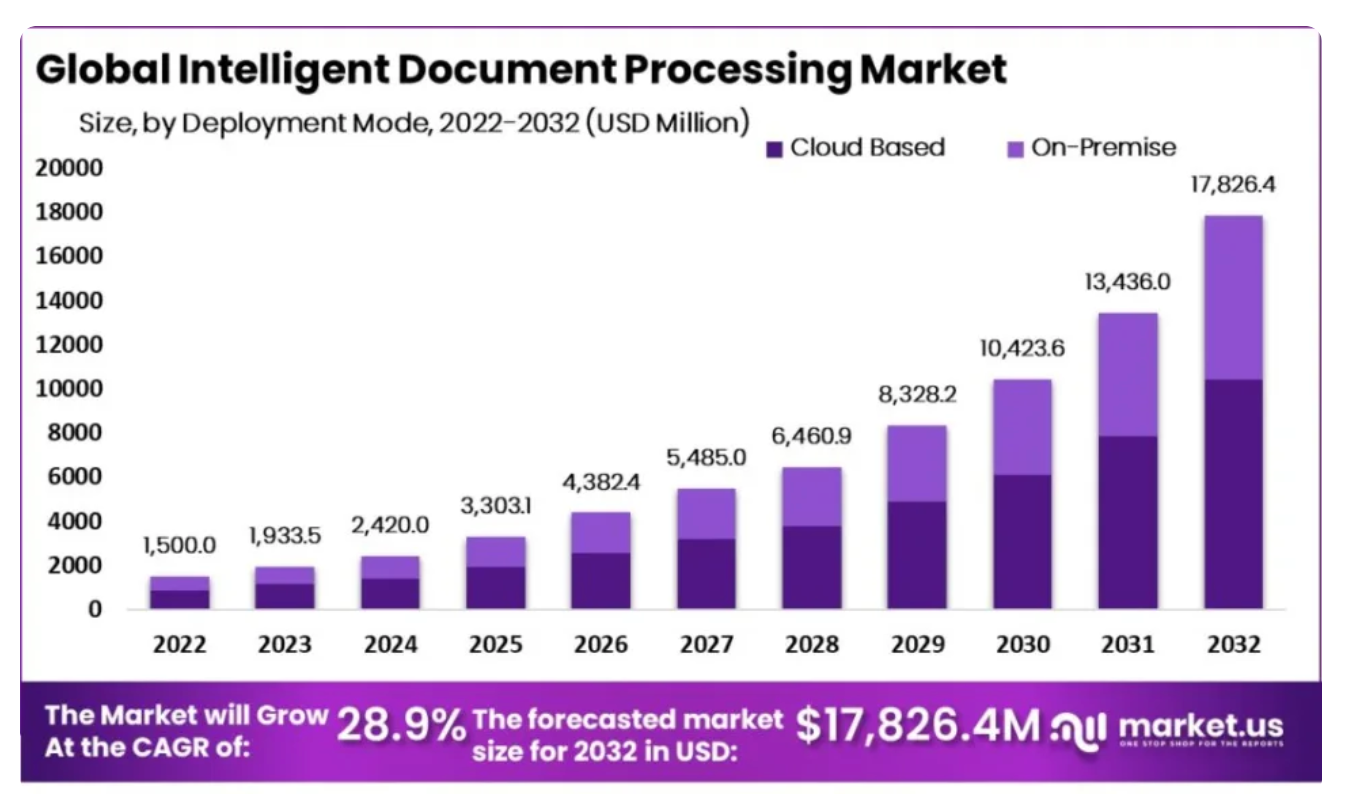
- Size in 2023: USD 1,933.5 million
- Projected Size by 2032: USD 17,826.4 million
- Compound Annual Growth Rate (CAGR): 28.9% from 2023 to 2032
- Technologies Involved: AI, natural language processing, machine learning, optical character recognition
- Deployment Mode: Cloud-based deployment is dominant, accounting for 58.4% of the market
- Technology Segment Leader: Machine learning with a 46.8% revenue share
- User Segment Leader: Large enterprises, representing a 73.6% revenue share, especially in BFSI
- Regional Leader: North America, with a 32.6% revenue share
Market Opportunities
- Cloud-Based Solutions Expansion: With cloud-based deployment holding a dominant share, there is an opportunity to further develop and offer scalable, flexible, and cost-effective IDP solutions that cater to the needs of various business sizes, especially for small to medium enterprises (SMEs) looking for cost-effective solutions.
- Integration with Emerging Technologies: As AI and machine learning technologies continue to evolve, integrating these advancements into IDP solutions can offer new capabilities and improve existing functionalities, providing a competitive edge.
- Enhanced Data Security Solutions: With the growing concern for data privacy and regulatory compliance, developing IDP solutions that offer advanced security features and ensure compliance with global data protection regulations can be a significant opportunity.
- Customized Solutions for Specific Industries: Tailoring IDP solutions to meet the unique needs of different industries such as healthcare, legal, and finance can open up niche markets and provide specialized services.
- Global Market Penetration: While North America currently dominates the market, there is a substantial opportunity to penetrate other regions, especially the Asia Pacific, which is projected to grow significantly due to technological advancements and increased adoption.
- Partnerships and Collaborations: Forming strategic partnerships with technology providers, industry-specific software vendors, and consulting firms can help in expanding the reach and capabilities of IDP solutions.
- Innovation in Machine Learning Models: Since machine learning is a key technology within IDP, developing more sophisticated algorithms that can handle larger and more complex datasets with higher accuracy presents a significant opportunity.
- Education and Training Services: Offering training and educational services to help businesses understand and effectively utilize IDP solutions can be a growth opportunity, especially for new market entrants.
- Solutions for Remote Workforces: With the increase in remote work, there is an opportunity to develop IDP solutions that facilitate seamless document processing and collaboration across distributed teams.
- Mergers and Acquisitions: The IDP market includes a range of players from startups to established corporations. There may be opportunities for strategic mergers and acquisitions to consolidate market positions and gain access to new technologies or customer bases.
How Does AI Contract Review Tools Work?
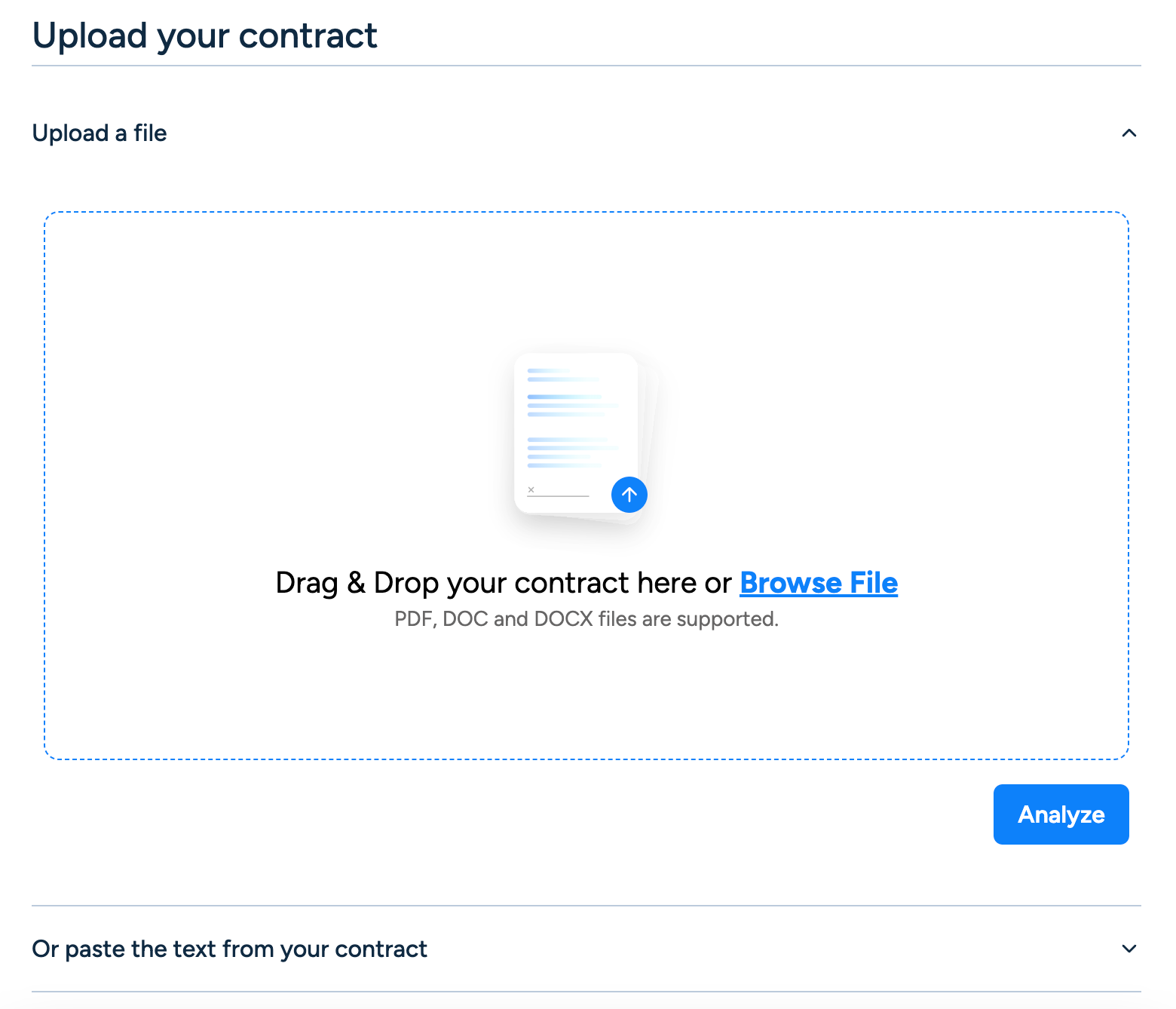
Document Upload
Users start by uploading their contract documents to the secure platform, typically in formats like PDF or text.
AI Analysis
The AI engine, powered by machine learning models, processes the text of the contract. It uses natural language processing (NLP) to understand the context and meaning of the words and phrases.
Issue Identification
The AI is trained to recognize standard contract clauses and identify potential issues, such as unfavorable terms, missing protections, or clauses that may not comply with specific jurisdictions’ laws.
Risk Assessment
The tool evaluates the identified issues based on their potential impact and categorizes them by risk level (e.g., high, medium, low).
Insight Generation
The AI generates a report with informational insights, explaining the implications of the identified issues and suggesting possible actions or negotiations.
What Advantages Do AI Contract Review Tools Have Over ChatGPT?
Accuracy and Risk Reduction
Contract review AI tools are often trained on specific legal data sets, enabling them to understand legal language and identify problematic clauses with increased accuracy. This helps minimize errors that could occur when using a general language model like ChatGPT, which is not specifically optimized for legal work.
Customization and Adaptability
AI contract review tools can be tailored to the specific needs of a company or industry. They can integrate specific contract templates and compliance standards, which is not always possible with ChatGPT. This allows for more targeted and relevant document reviews.
Data Analysis and Sorting
Contract review AI tools can perform advanced data analyses, allowing users to sort and extract relevant information from multiple contracts simultaneously. This is particularly useful for legal teams that need to manage a high volume of documents.
Who Are Using AI Contract Review Tools and For What?
Legal Professionals (Lawyers, Paralegals, Legal Departments)
Purpose: AI contract review tools help legal professionals streamline the process of reviewing and drafting contracts. These tools can identify key terms, flag potential risks, ensure compliance with relevant laws, and compare contracts against standard templates or past agreements. This reduces the time spent on routine tasks, allowing legal teams to focus on more complex, strategic work.
Procurement and Supply Chain Management
Purpose: AI contract review tools are used in procurement and supply chain management to review vendor and supplier contracts. These tools help ensure that contracts align with company policies, flag unfavorable terms, and monitor compliance with supply chain standards, ultimately helping to mitigate risks in vendor relationships.
Human Resources (HR) Departments
Purpose: HR departments use AI tools to review employment contracts, agreements related to benefits, non-disclosure agreements (NDAs), and other employee-related legal documents. These tools help ensure compliance with labor laws, consistency in terms, and quick identification of any potential legal issues.
Real Estate Professionals
Purpose: In the real estate sector, AI tools are used to review contracts related to property sales, leases, and financing. These tools help ensure that contracts are legally sound, flag any unusual clauses, and expedite the overall contract management process.
Financial Services
Purpose: Banks, insurance companies, and other financial institutions use AI contract review tools to manage a variety of contracts, including loan agreements, insurance policies, and investment documents. The tools help ensure regulatory compliance, identify risks, and automate the review process for faster turnaround times.
Startups and Small Businesses
Purpose: Startups and small businesses, which often lack extensive legal resources, use AI contract review tools to manage contracts efficiently. These tools provide them with the ability to review contracts quickly, ensure they understand the terms, and avoid costly legal mistakes.
Compliance Officers
Purpose: Compliance officers use AI contract review tools to ensure that contracts adhere to regulatory requirements and company policies. These tools help identify any deviations or non-compliance issues, ensuring that the company remains within legal and regulatory frameworks.
Sales Teams
Purpose: Sales teams use AI tools to review customer contracts and agreements to ensure that the terms align with the company’s goals and policies. The tools can help expedite the contract approval process, allowing deals to close faster.
Intellectual Property (IP) Managers
Purpose: AI tools are used to review licensing agreements, patents, and other IP-related contracts. These tools help ensure that IP rights are properly protected, terms are clear, and potential risks are identified.
What Are the Benefits of AI Contract Review Tools in Real-life Scenarios?
Reduced Review Time
One of the main benefits of AI-powered contract review tools is their ability to significantly reduce the time required to review documents. These tools can quickly analyze large volumes of contracts, identifying contractual risks and proposing modifications within minutes, which would be impossible with manual review. This allows legal teams to focus on more strategic tasks rather than repetitive ones.
Improved Accuracy
AI-based tools are designed to minimize human errors. By utilizing advanced algorithms, they can detect inconsistencies and problematic clauses that might go unnoticed during manual review.
Cost Savings
Integrating AI into the contract review process can also lead to significant cost savings. By automating the review tasks, companies can reduce the need to hire additional lawyers to manage the workload, thereby decreasing operational costs. Additionally, faster contract review can accelerate the negotiation process, allowing companies to close deals more quickly.
Risk Management
AI-powered contract review tools also help mitigate risks by providing detailed analyses of contractual clauses. They can flag terms that could potentially pose issues in the future, enabling legal teams to make informed decisions before finalizing a contract. This is particularly useful in industries where contracts are complex, and legal implications can be significant.
What Are Top AI Contract Review Tools?
Contract review AI Tool 1: goHeather
goHeather offers an AI-powered contract review service that provides lawyer-trained insights to help users understand and negotiate contracts before signing, with a free trial and various pricing tiers to suit different needs.
Pricing tiers are as follows:
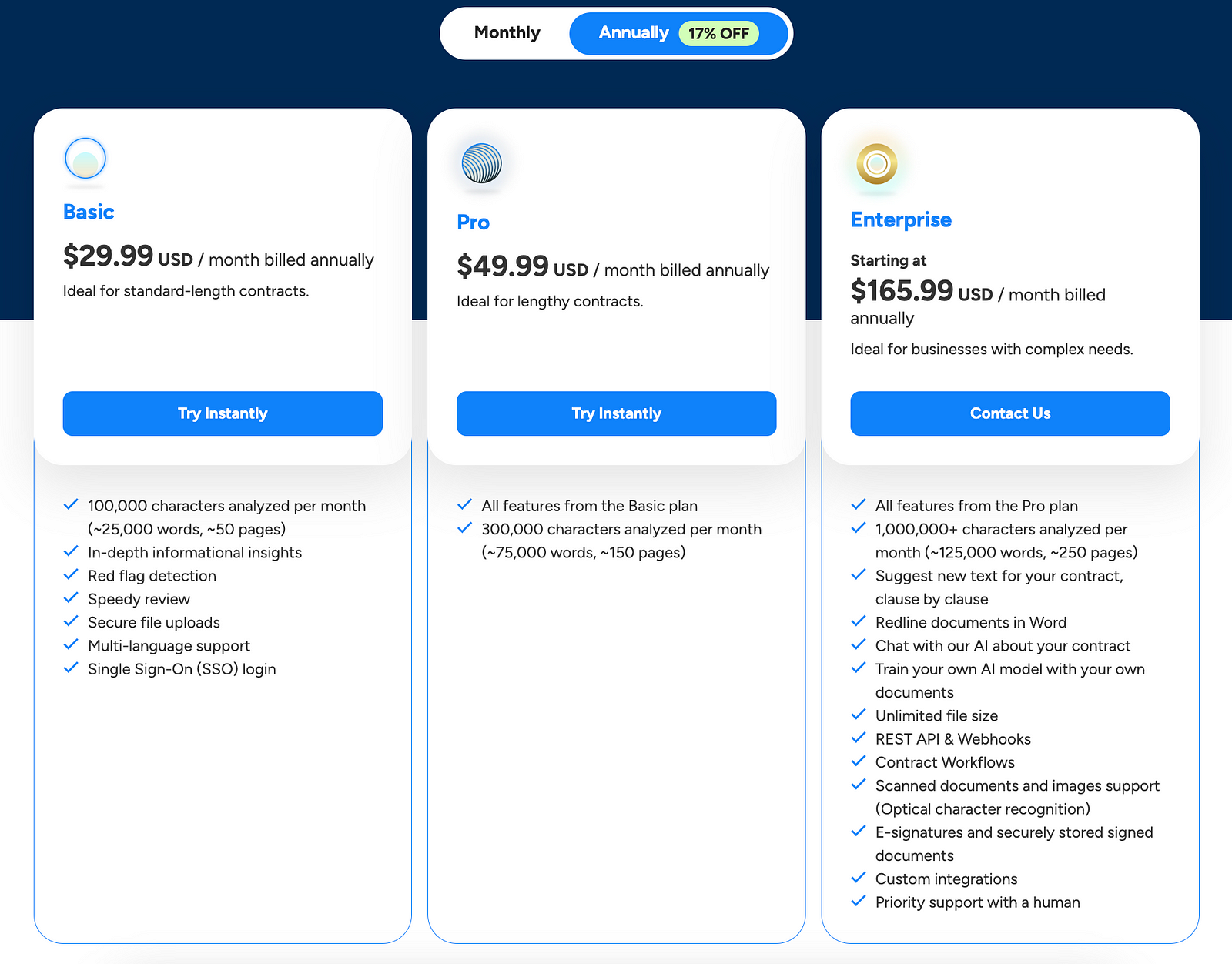
Contract review AI Tool 2: Juro
Juro’s Legal AI Assistant streamlines contract management by automating drafting, review, and summarization with AI, ensuring lawyer-grade security and compliance.
Juro offers customed pricing that scales with unlimited users.
Contract review AI Tool 3: ContractSafe
ContractSafe is a user-friendly contract management software designed to streamline the contract lifecycle with features such as centralized document storage, advanced search capabilities, automated renewal notifications, and integration with other tools. It caters to companies seeking an alternative to complex and expensive contract management systems, providing a cost-effective solution with transparent pricing based on the number of contracts rather than the number of users.
Pricing plans are as follows:
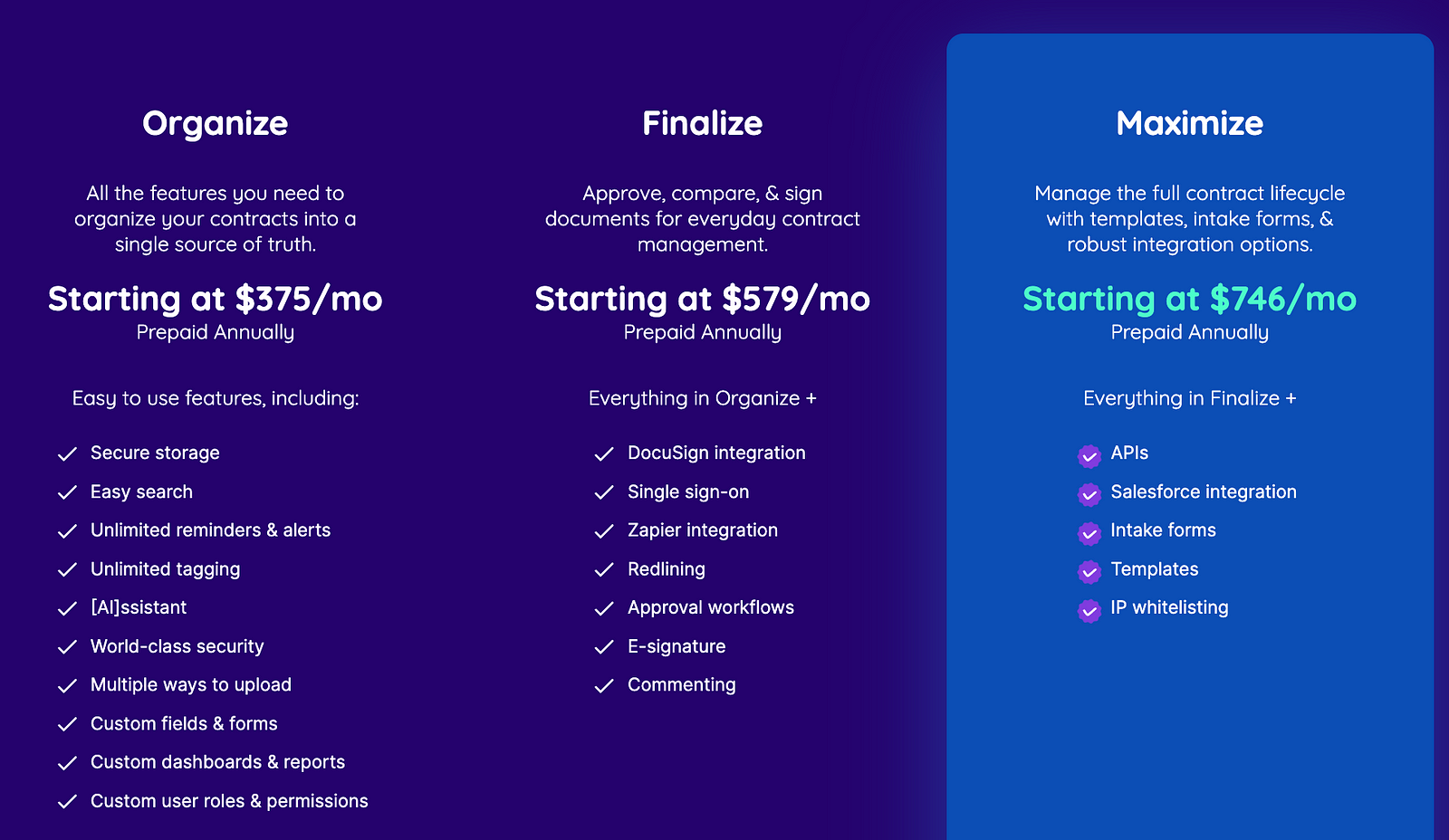
Contract review AI Tool 4: LegalOn
LegalOn’s AI Contract Review platform enables legal teams to review contracts with unprecedented speed, reducing the time spent on reviews by up to 85%. It is designed to handle both first and third-party contracts, ensuring thorough analysis and adaptation to specific risk preferences. The platform offers real-time practical guidance, including sample language, and supports document review in Word or web formats.
LegalOn offers a demo after submitting your email address.
Contract review AI Tool 5: Legly
Legly offers an AI-powered online contract review platform designed to highlight critical issues, extract metadata, and provide a comprehensive overview of contract portfolios for various clients including legal tech and service providers, law firms, enterprises, and businesses.
Pricing plans are as follows:
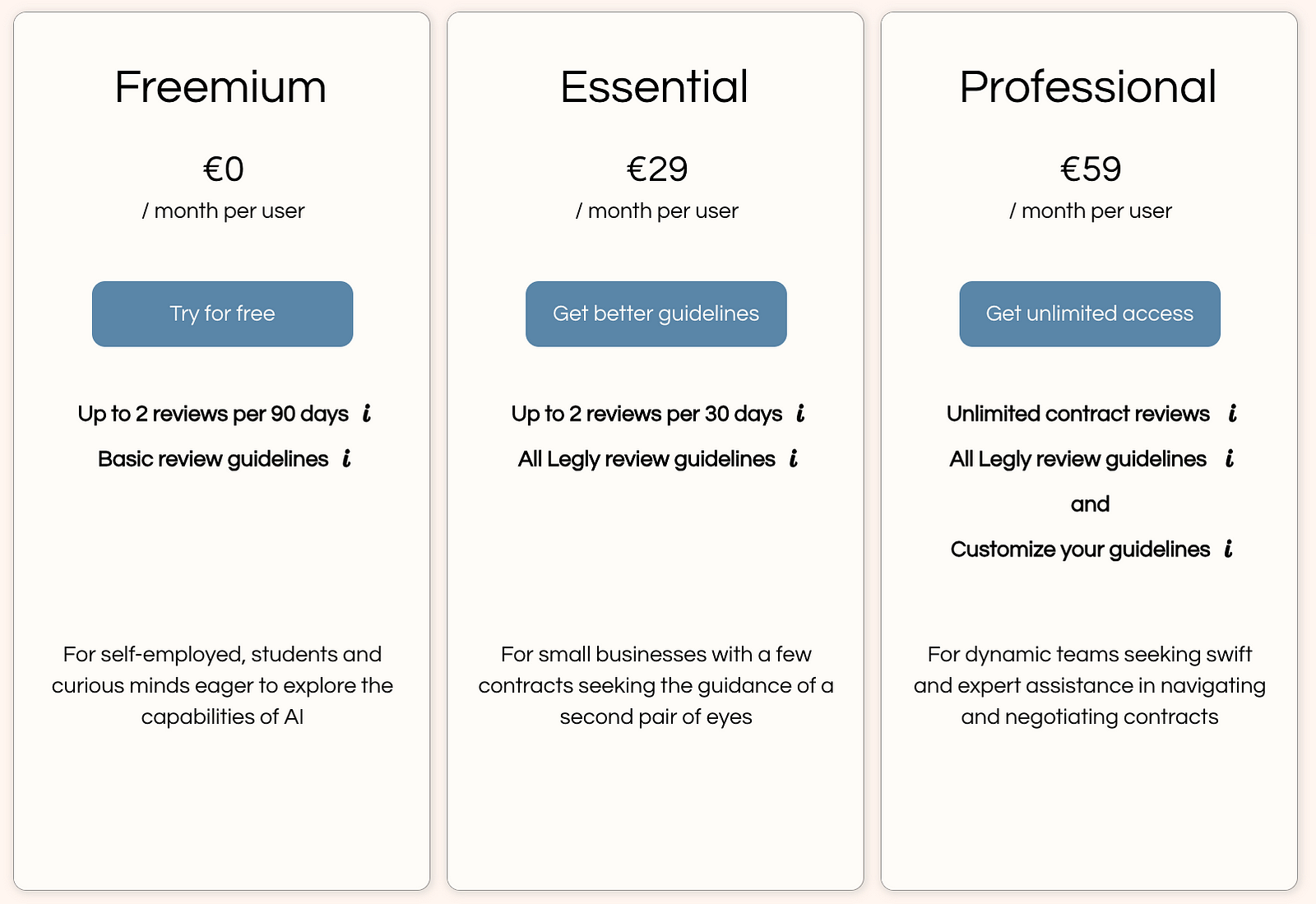
Contract review AI Tool 6: DocJuris
DocJuris offers an AI contract review software that streamlines the contract management process by automating analysis, enhancing collaboration, and ensuring compliance, thereby saving time, increasing accuracy, and reducing risk for legal, procurement, and sales teams across various industries.
DocJuris offers a free demo after submitting relevant information.
Contract review AI Tool 7: Ironclad
Ironclad’s contract review AI streamlines the legal process by automating repetitive tasks, enhancing efficiency, and reducing human error across various departments, while also providing valuable insights from contract data analysis.
Ironclad pricing plans depend on specific solutions that you are searching for.
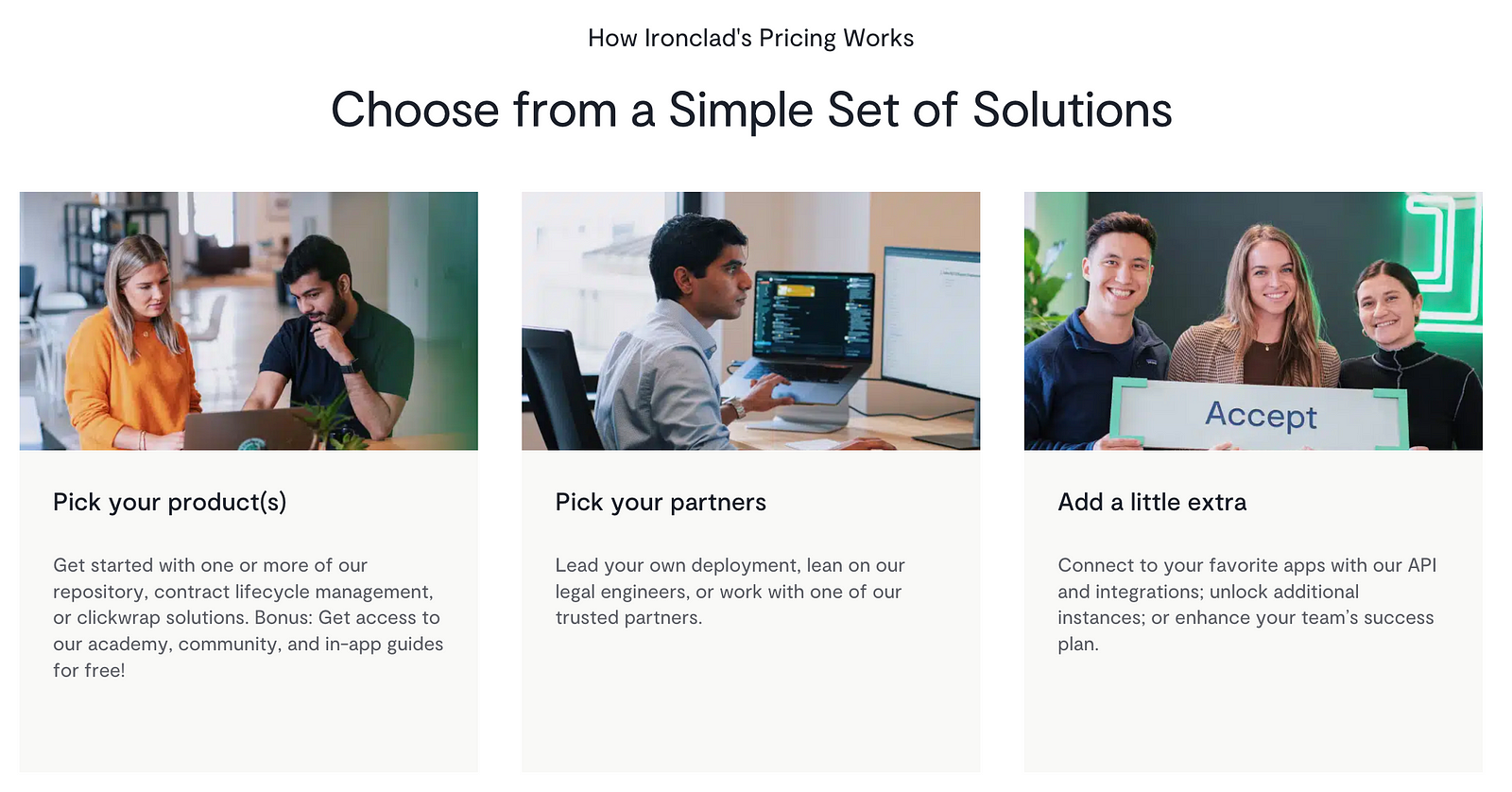
What to Consider When Developing an AI Contract Review Tool?
Market Considerations
- Target Audience: Identify your primary users — law firms, in-house legal teams, or businesses. Tailor your tool’s functionality, user interface, and pricing model to their specific needs.
- Compliance and Legal Standards: Ensure that your tool adheres to industry standards and regulations, such as GDPR, CCPA, or industry-specific guidelines like those in finance or healthcare. Non-compliance can lead to legal liabilities and loss of trust.
- Competition and Differentiation: Analyze existing contract review tools to identify gaps or unmet needs. Differentiate your product by offering unique features (e.g., better UX, faster processing, more accurate insights) or focusing on a niche market.
- Pricing Strategy: Consider subscription models, pay-per-use, or freemium approaches. Pricing should reflect the value provided and be competitive with existing solutions.
Technical Considerations
- Large Language Model (LLM) API Integration: When integrating an LLM API into your development process, it’s essential to choose a model that not only fulfills your technical needs but also fits within your budget — a crucial consideration for AI startups focused on resource efficiency. Novita AI LLM API is particularly noteworthy for its cost-effective approach, delivering high-quality performance without sacrificing affordability. Novita AI offers access to a range of advanced LLMs, including Meta’s Llama 3 and Llama 3.1 series, Microsoft’s WizardLM-2, and Google’s Gemma 2, among others. Try our Free Trial on the Playground.

- Data Privacy and Security: Contracts often contain sensitive information, so robust encryption and secure data storage are non-negotiable. Ensure compliance with relevant data protection laws (e.g., GDPR, HIPAA).
- Accuracy and Validation: Train the model on legal-specific data to improve accuracy in identifying and interpreting clauses, obligations, risks, and other legal concepts. Implement a validation process where human experts review the AI’s output to ensure reliability and build user trust.
- User Interface (UI) and Experience (UX): Design a user-friendly interface that allows for easy document upload, review, and interaction with AI-generated insights. Ensure the tool can seamlessly integrate into existing workflows (e.g., compatibility with document management systems, email, or CRM tools).
- Scalability and Performance: Plan for scaling as user demand grows. The tool should efficiently handle increasing volumes of contracts and users without degrading performance.
- Continuous Learning and Updates: Implement mechanisms for continuous learning, allowing the AI to improve over time based on user feedback and new legal trends. Regular updates will keep the tool relevant and accurate.
What Are the Risks of AI In Law?
Privacy Risks
One of the main risks associated with the use of AI in law is the violation of privacy. LLMs can inadvertently learn and reproduce sensitive information present in the training data. This can lead to the generation of outputs that compromise client confidentiality, which is particularly concerning in the legal field where confidentiality is paramount.
Algorithmic Bias
Another major risk is algorithmic bias. AI systems can reflect or amplify biases present in the data on which they are trained. This can lead to unfair or discriminatory decisions, which is unacceptable in the legal domain. Lawyers must be aware of these biases and ensure that the AI tools they use are designed to minimize these risks.
Legal Liability
The issue of liability is also crucial. If an AI tool makes a mistake, it can be difficult to determine who is responsible: the AI developer, the user, or the company employing it. This raises concerns about legal liability and the need for clear regulations to govern the use of AI in law.
Outdated Legal Information
Another risk is that because laws and regulations frequently change, AI contract tools may not be updated in a timely manner. This could lead to errors in judgment, as the AI might base its decisions on outdated legal information.
What Are the Future Trends of AI in Law?
Automation of Legal Tasks
One of the most significant trends is the increasing automation of legal tasks. Law firms are adopting AI tools to conduct contract analysis, document review, and the drafting of legal documents, allowing lawyers to focus on more strategic and higher-value tasks.
Improvement in Accessibility of Legal Services
AI has the potential to make legal services more accessible. By automating processes and reducing costs, it is expected that more people will be able to access legal advice. This is particularly relevant in areas such as family law and civil rights defense, where legal representation can be crucial.
New Specializations in Law
As AI becomes integrated into legal practice, new specializations will emerge. Lawyers will need skills in areas such as AI ethics, the regulation of emerging technologies, and data protection. This will create job opportunities in fields that did not previously exist, such as consulting on the use of AI in legal practice.
Ethical and Privacy Challenges
With the increased use of AI, concerns about ethics and privacy also arise. The American Bar Association (ABA) has formed a task force to study the impact of AI on the legal profession, addressing risks such as biases in algorithms and data security.
Collaboration between Humans and Machines
Finally, AI tools are designed to enhance productivity and the quality of legal work, allowing legal professionals to focus on applying their knowledge and skills rather than on repetitive tasks.
Conclusion
For developers looking to enter the AI contract review space, understanding both the technical and market aspects is crucial. This guide has highlighted the key components of AI contract review tools, including market size, major players, and the technologies that power these solutions. As you move forward in developing your tool, focusing on customization, data security, and integration with emerging technologies will be essential.
By addressing the specific needs of legal professionals and staying ahead of industry trends, you can create a tool that not only competes in this growing market but also sets a new standard for efficiency and accuracy in contract management.
Novita AI is the All-in-one cloud platform that empowers your AI ambitions. Integrated APIs, serverless, GPU Instance — the cost-effective tools you need. Eliminate infrastructure, start free, and make your AI vision a reality.
Recommended Reading
Mastering AI Facebook Post Generator For Developers: Market, Players and More
Comprehensive Developer Guide for Top AI Chatpdf Gratis Tools
Perchance AI Story Generator Tips: Build Your AI Narrative